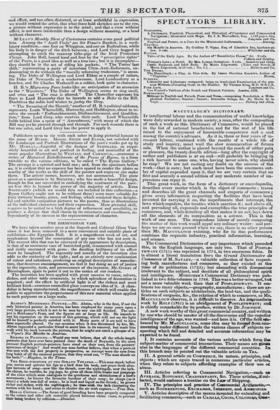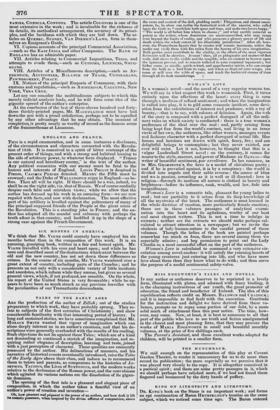MACCULLOCIIS DICTIONARY.
IF intellectual labour and the communication of useful knowledge were duly rewarded in modern society, a man, after the composition of such a work as this Dictionary of Commerce, would be placed in the list of national benefactors, and for the rest of his life raised to the enjoyment of honourable competence and a seat among the country's advisers. As it is, three or four years of in- cessant labour, combined with the results of a whole life of study and inquiry, must wait the slow remuneration of future sale. When the author is placed beyond the reach of either pain or pleasure, the twenty-fourth edition—long after the copyright of author and publishers is at an end—will probably be bringing in a rich harvest to some one, who, having never sown, why should he reap? We are not casting any doubt on the success of the work—that is sure; but such must have been the enormous out- lay of capital expended upon it, that we are very certain that no first and scarcely a second edition of any moderate number of im- pressions can repay it. This great work, in the form of a dictionary or encyclopaedia, describes every matter which is the object of commerce ; traces and describes all the great channels and emporia of commerce ; gives every information respecting the facilities that have been invented for carrying it on, the impediments that intercept, the laws which regulate, the treaties which sanction it ; and above all, and pervading all, expounds and exemplifies the true principles of commerce, and, while detailing all that makes it an art, lays down all the elements of its composition as a science. This is the work of one man. The stupendous labour of merely composing the matter of this work would appal any ordinary writer : and per- haps we are on sure ground when we say, there is no other person than Mr. MACCULLOCH existing, who for its due performance combines the requisite industry, practical information, learning, and science.
The Commercial Dictionaries of any importance which-preceded this, in the English language, are only two. That of POSTLE- THWAYT (1751) was reprinted in 1774, in two enormous folios. It is almost a literal translation from the Grand Dictionnaire de Commerce of M. SAVARY,—a valuable collection of facts respect- ing both manufactures and commerce, as they existed at the time of its publication (1723); but abounding with discussions irrelevant to the subject, and destitute of all philosophical spirit and intelligence. MORTIMER'S Coinmercial Dictionary was pub- lished in two folio volumes in 1766. This was a better-arranged, but not a more valuable work than that of POSTLETHWAYT. It em- braces too many objects,—geography, manufactures ; there are ;tr. tides on such subjects as architecture, the land-tax, and the quali- fications of surgeons, &c., the relation of which to commerce, as Mr. MACCULLOCH observes, it is difficult to discover. An intermediate. work by ROLT (1761) is an abridgement of PosrmrawArr; and is chiefly remarkable for its preface, written by Dr. Jonrisorr. A new work worthy of this great commercial country, and written by one who should be master of all the discoveries and the superior intelligence of the age, was wanted—and here it is. Ofthe field efu- braced by Mr. MACCULLOCH, some idea may be formed from enu- merating under different heads the various classes of 'subjects re- specting which fall and detailed and accurate information may be expected to be found.
I. It contains accounts of the various articles which form, tba subject-matter of commercial transactions. Their names are &ea also in the languages of the different commercial countries. In this branch may be pointed out the valuable article on TEA.
II. A general article on COMMERCE, its nature, principles,. and objects ; which are again traced in numerous particular articles, when they relate to subjects affording examples of their use or abuse.
III. Articles referring to Commercial Navigationi--suela as AVERAGE,BOTTOMRY, CHARTERPARTY, &e, These articles,ifeel- lected, would embrace a treatise on the Law of Shipping.
IV. The principles and practice of Commercial Aritb,metie•„—, such as BOOKKEEPING, EXCHANGE, IN=REST, and Aimanxiss.
V. Articles descriptive of the meansinvented for extending anti facilitating commerce,—such as CArcsus,,COINS, COL.ONIE,44)sw! PANIES, CONSULS, CONVOYS. The article COLONIES is one of the most extensive in the work ; and is invaluable for the richness of its details, its methodical arrangement, the accuracy of its princi- ples, and the lucidness with which they are laid down. The ar- ticles on QUEBEC, SYDNEY, VAN DIEMEN'S LAND, form in them- selves an Emigrant's Guide.
VI. Copious accounts of the principal Commercial Associations, —such as the EAST INDIA and other Companies. The BANK OF ENGLAND has an admirable paper.
VII. Articles relating to Commercial Impositions, Taxes, and attempts to evade them,—such as CUSTOMS, LICENCES, SMUG- GLING.
VIII. Articles of a Miscellaneous description,—such as AP- PRENTICE, AUCTIONEER, BALANCE OF TRADE, CONTRABAND, PAWNBROKERY, PIRACY.
IX. Notices of the principal Emporia of Commerce, with their customs and regulations,—such as AMSTERDAM, CALCUTTA, NEW YORK, VERA CRUZ.
Let any one consider the multitudinous subjects to which this merely indicial analysis leads, and he will form some idea of the gigantic spread of the author's enterprise.
At the conclusion of the last of these eleven hundred and forty- three thickly-printed pages, Mr. MACCULLOCH must have laid down the pen with a proud satisfaction, perhaps not to be equalled by any other advantage that he may obtain. The moment of completion...is pretty nearly as worthy of record as the famous scene of the Summerhouse at Lausanne.























 Previous page
Previous page